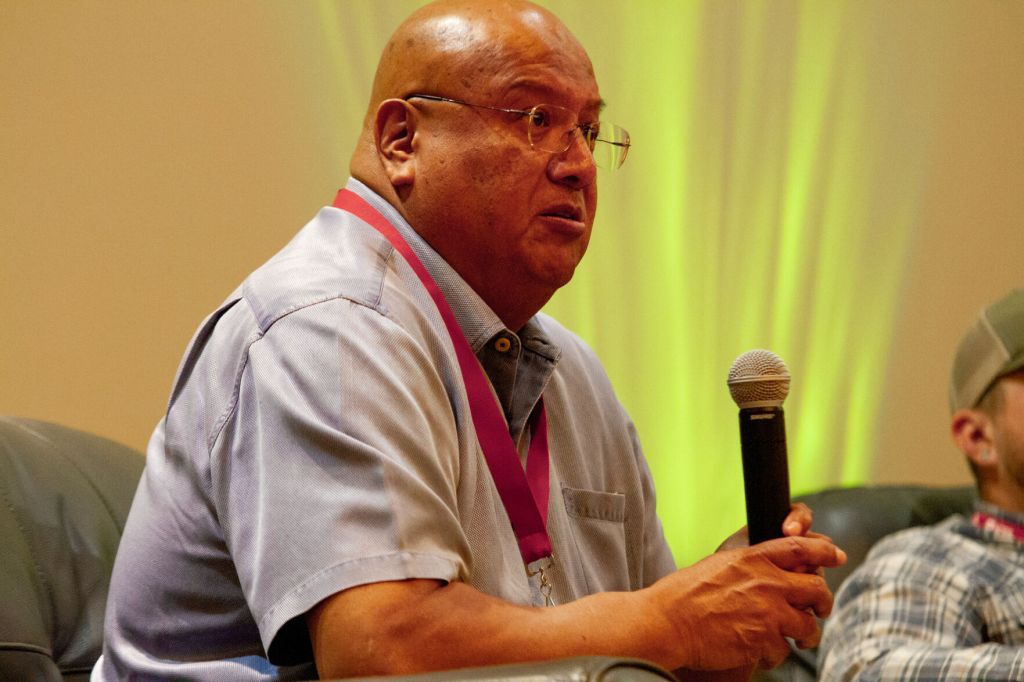Tribes highlight regenerative ag at Northwest Native Economic Summit
Published 6:00 am Thursday, October 5, 2023

- Alfonso Contreras, sales marketing manager of Yakama Nation Farms, Washington, discusses the sales of seasonal food Wednesday, Oct. 4, 2023, at the Northwest Native Economic Summit at Wildhorse Resort & Casino in Mission.
MISSION — The Tribal Farm Enterprise on the Umatilla Indian Reservation increased its cover crop acreage 250 acres in a year.
Trending
Kevin Hudson, the Tribal Farm Enterprise manager for the Confederated Tribes of the Umatilla Indian Reservation, said planting cover crops is a way he has been implementing a regenerative agriculture approach. Hudson was part of a panel who gave their personal and professional experiences with regenerative agriculture Wednesday, Oct. 4, during the Northwest Native Economic Summit at Wildhorse Resort & Casino, Mission.
Regenerative agriculture is a historic farming practice that focuses on harmony among people and nature. It is rooted in Indigenous practices, but is becoming popularized across the United States.
Hudson said he has found cover crops limit wind erosion, help prevent runoff, reduce chemical use and fix the nitrogen other plants often get through fertilizer, all of which leads to healthier soil.
Trending
Peas and mustard are two of the main cover crops Hudson is growing, and during the past few years, the cover crop acreage on the Tribal Farm Enterprise has grown from an initial 650 acres in 2021 to 900 acres in 2022.
“And it’s also beneficial as a farmer that is expected to make money for the tribe,” he said, “as it reduces our labor and fuel use tremendously.”
Dave Tovey, executive director of Nixyaawii Community Financial Services, moderated the discussion. Panelist Paula Wallis, the secretary and treasurer for Tiicham Conservation District on the reservation, said she grew up caring for the land because of knowledge her father passed down.
But she said she didn’t realize the true value of his approaches until she learned about regenerative agriculture. Since then, she has gained an understanding of the connection between herself and the land. She said she believes the land, the food and we as people are all connected.
“If we want to use it, we can’t abuse it,” she said. “It’s up to us to take care of the Earth that we live on, and if we don’t do it respectfully, honorably, and right now, diligently, we are going to lose what we have and we’re going to be a dying race.”
In the session, Alfonso Contreras, marketing manager at Yakama Nation Farms in Washington, said his role is to guide the farm and youth. They have about 1,500 acres in production, growing produce to sustain their community and to sell.
The farm’s mission emphasizes local access to fresh, sustainable and quality produce. These goals also are central to the general practice of regenerative agriculture.
Benefits of regenerative agriculture are ecological, economic, mental and physical, and for the community in which the practice occurs, according to the National Resources Defense Council.
For the CTUIR, Hudson said, “we just use the model of slow, steady growth.”
Implementing solutions that could be helpful to combat climate change is another way the Tribal Enterprise Farm is growing. Cover crops are one way. To plant cover crops, TFE has partnered with GO Seed, a Salem-based seed producer, and other organizations as part of a Climate Smart Commodities Grant through the U.S. Department of Agriculture.
Biochar, which is burned organic material that looks like charcoal, can help support plant growth. Hudson said TFE is going to treat biochar as an extra mineral for the soil, to help support soil and crop health.
To honor Hudson’s work with and continued commitment to TFE and the whole tribe, Tovey and Wallis presented him with a wool blanket.









